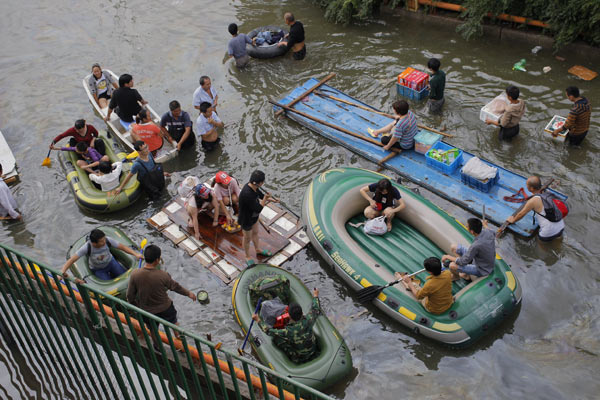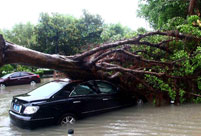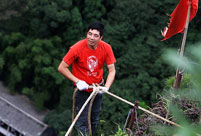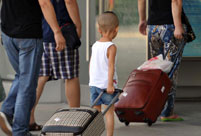 |
| Residents in an area of Yuyao that was still underwater on Thursday use boats and makeshift rafts as part of the rescue effort. Gao Erqiang / China Daily |
Water levels drop slightly four days after disaster strikes
Yuyao resident Zhu Qianshuang and her two children, including her 18-month-old son, spent another day in the flooded city, short of food and clean water.
Zhu, who is one of hundreds of migrant workers in Yuyao, has managed to survive the disaster in the past few days but has become increasingly worried about her baby, who has not had any milk powder and has instead been fed on milk tea she bought from a grocery.
"He will become ill if we cannot find proper food for him," said Zhu, who like many of the city's 800,000 victims has been living on instant noodles and fast food.
On the fourth day after the heaviest rainfall in 100 years battered the city, the skies finally cleared and water levels on the city's rivers dropped slightly.
At about 4 pm on Thursday, the water level on the Yaojiang River, which runs through the city, dropped to 4.95 meters from the record 5.33 meters in the past few days. But it is still 0.25 meters above the previous record high.
Public services, including power, tap water and telecommunications, resumed slowly.
A large part of the city remained blacked out on Thursday, and officials said they were having short-term difficulty in restoring power.
Wu Guocheng, head of the Ningbo Electric Power Bureau, said the city's biggest power load stood at 589,000 kW on Thursday, or half of its usual level.
China Mobile, a major telecom service provider, has repaired more than 70 percent of its 867 work stations in the city. China Telecom, another supplier, still has its fixed lines paralyzed.
Tap water in downtown areas was expected to resume by 8 pm on Thursday, with authorities busy repairing the city's two major water plants.
A large swathe of Yuyao, with a population of 1.3 million, remained submerged by floodwaters.
Traffic jams were common as lanes on some roads were occupied by vehicles shifted by dealerships or car owners from low-lying areas. On some sections, cars moved slowly and casually in all directions.
Mountains of garbage piled up. Residents simply helped their children answer the call of nature on roadsides.
All kinds of items, including two discarded refrigerators bound together, were used by residents in the chest-deep waters to salvage their belongings from inundated homes.
Most public transport services were not running. Only 15 temporary bus lines were operational. A few dozen taxis, out of the city's fleet of 440, could be seen on roads. Many drivers continued to pick up customers on their own after losing contact with their companies.
"I never saw such chaotic conditions in Yuyao," said taxi driver Zhou Wenzhuang, who grew up in the city.
'Relying on others'
In response to the disaster, the city government set up 289 settlement centers to accommodate those whose houses have been inundated.
Emergency workers and volunteers arriving from across the country were handing out relief materials in different areas hit hard by the downpour and floods.
At Sunjia, a village in Lubu township, Li Kexiu received a relief package, which included a case of biscuits and bottled water, from the government on Thursday afternoon. They were the first supplies she has received since residents in the area had been unable to get proper food since Monday.
"I had been relying on others' help to survive these days," the woman said.
Xu Yuancun, 52, said the distribution of food was not well organized as food-snatchers had been reported in different areas.
In Sunjiang village, residents were given coupons and told they could only pick food supplies from a relief truck if they had their coupons. But later, residents were told they could collect food as long as they showed their residence permits.
"It's important that we received help," Xu said, adding that her family of six, including two children, would have to rely on the two portions of food in the coming days.
In other areas, residents had to rely on themselves or each other for disaster relief. At Xinqiao village in the northern part of Yuyao, the owner of a mechanical parts company offered free meals and space in his workshop to accommodate nearby victims.
"We were offered three meals a day, including meat and vegetable dishes," Yang Shicheng, who is from Si-chuan province and looking for a job in Yuyao, said on Thursday.
"The factory owner told us we could stay and eat for free until at least Thursday. I am so thankful," he added.
Fighting the disaster
Xi Ming, mayor of Yuyao, described the flooding as unprecedented and put the city's direct economic losses at more than 20 billion yuan ($3.2 billion), three times the figure estimated on Tuesday.
"Our top job is guaranteeing the safety of residents and relocating them, especially the disadvantaged group, from danger," Xi said at a news conference.
So far, the city has evacuated nearly 100,000 residents from houses on the verge of collapsing.
It has also enhanced patrols at dams and reservoirs, taken measures to curb epidemics, and taken advantage of all platforms to release information about the disaster and tips for residents to get help, Xi added.
Amid complaints by residents approached by China Daily that the government has done a below-par job in disaster relief, Xi said he and his teams had been fully devoted to these efforts from Saturday.
He had been traveling between flood control headquarters and areas hardest hit by the disaster in the past 120 hours, he said. "Since the warning against Typhoon Fitow was released, all officials in the city and myself arrived at our positions to fight the disaster."
On the question of how to prevent residents from snatching food while relief workers hand out supplies, the mayor said both natives and non-natives will be treated equally.
The floodwaters in the city are expected to recede significantly as soon as Saturday.
 2013 Colour Me Rad 5K run held in Canada
2013 Colour Me Rad 5K run held in Canada China's destroyer Qingdao sails out of Sydney Harbor
China's destroyer Qingdao sails out of Sydney Harbor Chinese tycoon aims to restore London's Crystal Palace
Chinese tycoon aims to restore London's Crystal Palace Typhoon Fitow affects 4.56 million people in east China
Typhoon Fitow affects 4.56 million people in east China Game for the brave: 'Spiders' in Yandang Mountains
Game for the brave: 'Spiders' in Yandang Mountains Travel peak witnessed on last day of National Day holiday
Travel peak witnessed on last day of National Day holiday  New couples take wedding photos during holiday
New couples take wedding photos during holiday Serena Williams stumbles through to quarterfinals
Serena Williams stumbles through to quarterfinals Thailand Mobile Expo 2013 kicks off
Thailand Mobile Expo 2013 kicks off Photo collection of Chinese Navy
Photo collection of Chinese Navy Dense haze envelops N China
Dense haze envelops N China Twins Culture Festival kicks off in Beijing
Twins Culture Festival kicks off in Beijing UNESCO world heritage site: Montale Tower
UNESCO world heritage site: Montale Tower Israeli drone crashes into Mediterranean, fragments recovered
Israeli drone crashes into Mediterranean, fragments recovered Serena Williams wins second China Open title
Serena Williams wins second China Open titleDay|Week|Month